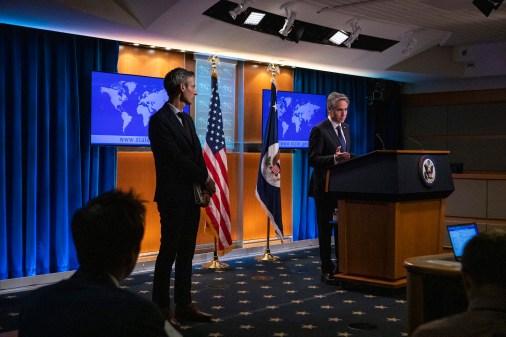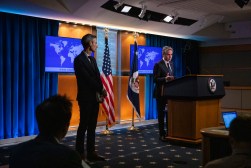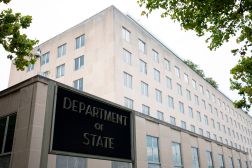 Richard Boly (Photo David Stegon/FedScoop)
Richard Boly (Photo David Stegon/FedScoop)Throughout her tenure as Secretary of State, Hillary Clinton has emphasized the need for American diplomacy to build “greater cooperation among a greater number of actors … tilting the balance away from a multi-polar world toward a multi-partner world.”
In a recent interview, Richard Boly, director of the State Department’s Office of eDiplomacy, highlighted the following new initiatives that are doing just that.
TechCamp
A joint venture between the Office of eDiplomacy and the Office of the Secretary’s senior advisor for innovation, the two-day TechCamps introduce foreign civil society organizations to low-cost, easy-to-implement technologies that can transform their work.
The TechCamp movement is the cornerstone of Secretary Clinton’s “Civil Society 2.0” initiative, bringing together local and foreign technology experts and civil society organizations in order to demonstrate how the latest, low-cost or free information technologies can be used to further civil society initiatives.
TechCamps take place over the course of two, tightly-organized, highly-interactive days, where civil society organization participants hear rapid-fire stories about projects achieved with easy-to-use and readily available technologies.
At TechCamps, civil society organizations also receive hands-on training on social media use, online organizing, digital safety, website development, digital citizen journalism and more, with each tool chosen because of its relevance to the civil society organizations’ missions.
To date, the eDiplomacy Office has facilitated 14 TechCamps reaching more than 50 nations and 800 civil society organizations that are engaged in issues such as women’s empowerment, social inclusion and open government.
Virtual Student Foreign Service eInternship
Announced by Secretary Clinton at a 2009 New York University commencement speech, the Virtual Student Foreign Service eInternship engage American students working virtually from university campuses in the United States and throughout the world.
These eInterns are partnered with U.S. diplomatic embassies overseas and State Department and U.S. Agency for International Development domestic offices to conduct digital diplomacy and further U.S. diplomacy by leveraging the talent of American college students. A related micro-volunteering program is also currently in pilot.
Tech@State
As part of Secretary Clinton’s 21st Century Statecraft initiative, Tech@State brings together technologists, government personnel, academics, entrepreneurs, and others to explore and exploit technology solutions that can help achieve U.S. diplomacy and international development goals.
Past Tech@State events have focused on such technology and diplomacy topics as wikis in government, real-time awareness, serious games, data visualization and mobile money. The next Tech@State conference will be held November 30-31, 2012 and will focus on the intersection of democratic elections and innovative election technologies.
“The overall purpose of these programs is to provide U.S. diplomats with skills and technologies needed for success in today’s more integrated and information-intensive environment, and to help our partners do the same,” Boly said.
“Of course, working closely and successfully with foreign and non-governmental partners also means sharing more information and proactively collaborating, something that was not nearly as encouraged during the many decades of the bi-polar, Cold War era of diplomacy. So, a significant part of these efforts continues to revolve around adjusting – as appropriate in light of security considerations – our traditional ‘need to know’ culture to more of a ‘need to share’ culture,” Boly added.
He continued, “In addition, in the past, diplomats often were seen as mainly observing and reporting on foreign developments. In contrast, today, the State Department seeks American diplomats with the talents and tools to build working partnerships, to manage initiatives and to achieve real results. While there is much more to do, these eDiplomacy programs are helping make this new mode of diplomacy a reality. And, ultimately this progress helps advance our international partnerships and our joint efforts to continue to expand peace, freedom and prosperity around the world.”
In addition to these initiatives, the eDiplomacy office manages a suite of programs that enable and encourage better communication and collaboration among State Department personnel, as well as the U.S. government foreign affairs community.
These include a department-wide wiki, online communities of practice or interest, an in-house networking platform used by nearly 11,000 department personnel and enterprise search.
The office’s newest addition to the suite is a tool that will let department users aggregate and personalize a wide variety of internal and external news and information sources into a single site.
eDiplomacy is piloting a beta version of the tool and hopes to move into full production early in the new year.
“Our goal,” Boly explained, “is to help department personnel find and contribute knowledge anywhere, anytime.”




